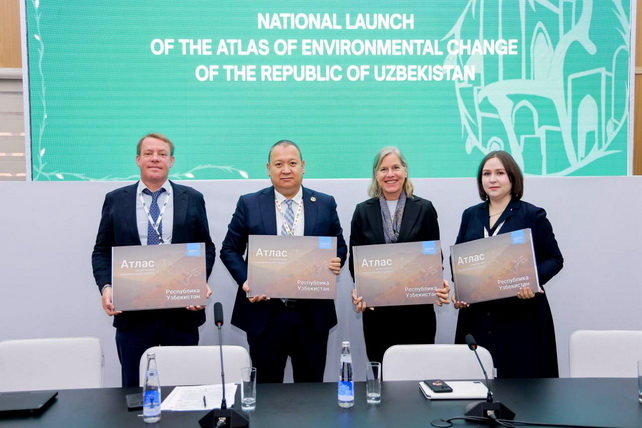
Uzbekistan Unveils Atlas of Environmental Changes
Uzbekistan Unveils Atlas of Environmental Changes
Tashkent, Uzbekistan (UzDaily.com) — The Atlas of Environmental Changes of the Republic of Uzbekistan was presented on the sidelines of the 20th Conference of the Parties to the Convention on International Trade in Endangered Species of Wild Fauna and Flora (CITES CoP20).
The event brought together representatives of government agencies, international organizations, research institutions, and the expert community.
Key speakers included Zhusipbek Kazbekov, Deputy Chair of the National Committee on Ecology and Climate Change; representatives from the Russian Ministry of Foreign Affairs; Susan Gardner, Director of the Ecosystems Department at the United Nations Environment Programme (UNEP); and leading researchers from Moscow State University and the Institute of Geography of the Russian Academy of Sciences.
The national launch of the Atlas represents a major outcome of a regional UNEP project, implemented with financial support from the Russian Federation. The initiative aims to strengthen the capacity of Central Asian countries to use modern geoinformation technologies for environmental monitoring and modeling changes in terrestrial and aquatic ecosystems.
Speaking at the session, Kazbekov emphasized that the Atlas marks a significant step toward expanding access to environmental data and enhancing the national monitoring system.
“The Eco-Atlas consolidates comprehensive, scientifically grounded data on land and water resources, biodiversity, climate change, and other critical environmental components. It provides an integrated understanding of long-term trends, transformation drivers, and areas of ecological risk — information essential for strategy development and policymaking,” he said.
During the presentation, participants were introduced to the main research findings, project implementation stages, and scientific materials prepared by Uzbek experts in collaboration with the Institute of Geography of the Russian Academy of Sciences and Moscow State University.
Special attention was given to the Atlas’s practical value as a decision-making tool, supporting sustainable environmental measures, monitoring, and resource assessment.
The event concluded with discussions on the prospects for applying the Atlas data within government bodies, research organizations, and specialized institutions, along with a Q&A session for participants.